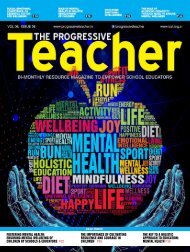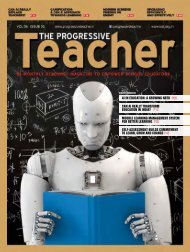The Progressive Teacher Vol 02 Issue 04
This issue of The Progressive Teacher focuses on "Teaching- Emotional Fulfillment and Self-Actualisation". The magazine provides guidance to the teachers by their peers and school leaders for tackling challenges with innovative ideas. Happy Reading!
This issue of The Progressive Teacher focuses on "Teaching- Emotional Fulfillment and Self-Actualisation". The magazine provides guidance to the teachers by their peers and school leaders for tackling challenges with innovative ideas. Happy Reading!
You also want an ePaper? Increase the reach of your titles
YUMPU automatically turns print PDFs into web optimized ePapers that Google loves.
ights and feelings of others, and also possess<br />
civic sense. How about the story of the young<br />
man who used to put on loud music in his<br />
house, disturbing all his neighbours in spite of<br />
their gentle protests? He never cared about<br />
others, but suddenly, one day, the music and<br />
noise ceased. Did the young man realise his<br />
folly? No. He had become completely deaf.<br />
<strong>The</strong>re are numerous real life stories inspiring<br />
courage in the hour of peril. Once, a child<br />
was sitting at the edge of the school ground<br />
during the recess when a snake suddenly<br />
climbed on his leg and coiled around it. <strong>The</strong><br />
child screamed for help. A crowd of teachers<br />
and students gathered but nobody dared<br />
come forward to help. His class teacher<br />
heard the flashed news and rushed out to<br />
the playground with the newspaper she was<br />
reading. This lady teacher had presence of<br />
mind. She grabbed the head of the snake<br />
with the newspaper and freed the child. I also<br />
tell the sad story of one of my senior college<br />
mates who sacrificed his life in trying to save<br />
his classmate who had accidentally slipped<br />
and fallen into a fast-flowing river. Without<br />
wasting a moment, he jumped into the water<br />
and saved his classmate but was himself<br />
swept away by the current. Such courage is<br />
an important trait of a strong character.<br />
History is a subject that is full of anecdotes<br />
for one’s edification. <strong>The</strong>re are many real<br />
life stories in history based on the lives of<br />
rulers and the common people that one can<br />
learn from. An imaginative history teacher<br />
can increase the pupils’ knowledge and<br />
also contribute to the edifice of character<br />
building. When talking of the evils of flattery<br />
and sycophancy, I love to narrate the story<br />
of Akbar’s Ghazi who was left in charge<br />
of the capital at Agra when Akbar had<br />
gone on a long campaign. On his return, the<br />
Ghazi proudly reported that he had passed<br />
the death sentence on a man (whom even<br />
the emperor did not like) and had had him<br />
executed. He expected Akbar to thank him<br />
for getting rid of that troublesome man. But<br />
Akbar became sad and said to the Ghazi:<br />
‘You were the judge and final authority.<br />
Could you not have found some extenuating<br />
circumstances to save the life of that man<br />
and forgiven him just once more.’<br />
Why is it that the construction of the<br />
Qutub Minar ( situated in Delhi ) started<br />
by Qutubuddin Aibak was continued by<br />
his successors, while another tower meant<br />
to be twice the height of the Qutub Minar<br />
started by Alauddin Khilji was abandoned?<br />
No one wanted to contribute to the building<br />
of a monument conceived in cruelty and<br />
arrogance!<br />
It requires great courage to forgive someone<br />
who insults us. Yet, we know that forgiveness<br />
is the only way to reform and win back the<br />
foe. I tell children the story a military officer<br />
who had become an alcoholic and for this<br />
his superiors had issued severe warnings.<br />
One night at a party, he drank excessively,<br />
and then confronted his immediate superior,<br />
who had a grudge against him, as he had<br />
imagined. He went to him fully drunk and<br />
abused him in front of other officers. <strong>The</strong> next<br />
day, he arrived late to office, but now being<br />
fully sober realised the enormity of his action<br />
and expected dismissal from service. He<br />
was summoned to his superior’s office. <strong>The</strong>y<br />
chatted over a cup of tea as if nothing had<br />
happened. <strong>The</strong> offending officer then realised<br />
the greatness of the man who had really<br />
forgiven him. This act of forgiveness changed<br />
the life of this young officer. He quit alcohol<br />
and became a model of good behavior.<br />
In these days of scams, dishonesty and<br />
corruption, real life stories abound about<br />
men of character. M’d Hussein, a taxi driver<br />
in Chicago, noticed a bag that had been left<br />
behind in his taxi. It contained expensive<br />
jewelry. He realised it belonged to the two<br />
men whom he had dropped off at a hotel.<br />
M’d Hussein returned to their hotel with the<br />
bag and gave it back to them. For his act of<br />
honesty, he was awarded a handsome<br />
cheque and a Citizen’s Award by the Mayor<br />
of the city.<br />
<strong>The</strong>re are innumerable real life stories<br />
of children who were obedient to their<br />
teachers and elders, or had been able to<br />
develop good habits when young, and later<br />
achieved success. Here is an anecdote about<br />
an interschool competition held for senior<br />
secondary students. None of the senior<br />
students were able to answer a tricky science<br />
question put to them, although they came<br />
from some of the most prestigious schools of<br />
Delhi. Finally, from the audience, a child of<br />
class V gave the correct answer. <strong>The</strong> assembly<br />
was stunned. Being a witness to this incident,<br />
I asked him how he knew the answer. He told<br />
me that he was a voracious reader and had<br />
read many science–fiction books written by<br />
Isaac Asimov. In the bargain, he had also<br />
read a book where mysterious science facts<br />
had been explained.<br />
<strong>The</strong> reading habit enhances the reader’s<br />
personality, transforming it into one that’s<br />
humane, benevolent and civilised. <strong>The</strong> reason<br />
is that in books one comes across varied<br />
ideas and situations: meet good, intelligent<br />
and interesting characters. When I ask the<br />
question, ‘What is a library’, the answer I get<br />
is, ‘It is a store house of books.’ But I tell my<br />
students that for me a library is ‘an assembly<br />
of the greatest minds that have ever lived on<br />
this earth.’ A reader, therefore, mingles with<br />
these minds. ‘If we encounter a man of rare<br />
intellect,’ said Emerson, ‘we should ask him<br />
what books he reads.’<br />
Reading enhances and ennobles one’s<br />
character. Eminent writer and columnist,<br />
Khushwant Singh reported an interesting<br />
incident. Once, an acquaintance of his<br />
phoned him to say that Khushwant Singh’s<br />
best friend, Mr. X had been arrested for<br />
corruption. Mr. Singh thought for a moment<br />
and said, ‘It’s impossible. He can never be<br />
corrupt.’ ‘Why so?’ asked his acquaintance.<br />
Khushwant Singh replied with confidence,<br />
‘Because he is a reader.’ Mr. Singh was<br />
proved right, for soon it turned out that it<br />
was a case of mistaken identity and the<br />
corrupt person was another man having the<br />
same name.<br />
Stories culled from the media, biographies of<br />
eminent persons, and every available source,<br />
will stimulate a love for books in young<br />
people and will help build character. No<br />
doubt, real life stories are a powerful tool in<br />
the classroom and beyond.<br />
From the publisher’s desk...<br />
What if you are a student in your own class?<br />
As a teacher, have you ever wondered<br />
what would happen if you are a<br />
student in your own class? Well,<br />
that needs a lot of retrospect…and you<br />
have to be true in your assessment.<br />
Imagine yourself as a student in your class.<br />
Do you like your teacher? Do you like<br />
his/her way of teaching? Do you<br />
understand what is taught in the class?<br />
Is the teacher ready to explain the<br />
concepts again? Does he/she get irritated?<br />
Is the teacher unbiased? Do you like what<br />
is taught? Do you look forward to attend<br />
the class the next day?<br />
If the answer is yes to all these questions<br />
above and you are happy to be a student<br />
in your class, you are a perfect teacher.<br />
But, if you feel intimidated or are not able<br />
to understand the concepts, it is time to<br />
think again.<br />
Children come to school to learn and<br />
enhance their knowledge. A teacher or the<br />
guru imparts this knowledge and kids look<br />
up to their teachers to enhance it…day<br />
after day. After all, a good teacher can<br />
inspire hope, ignite the imagination,<br />
and instill a love of learning.<br />
Let us aim to instill the love of learning<br />
Sonal Khurana<br />
sonal@progressiveteacher.in<br />
and go through this litmus test time<br />
and again!<br />
54 <strong>The</strong> <strong>Progressive</strong> <strong>Teacher</strong> Sep/Oct 2015


















